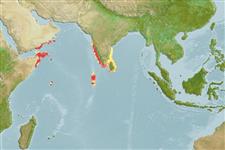Teleostei (teleosts) >
Scombriformes (Mackerels) >
Trichiuridae (Cutlassfishes) > Aphanopodinae
Etymology: Benthodesmus: Greek, benthos = depth of the sea + Greek, desmos = bond, chain (Ref. 45335).
Environment: milieu / climate zone / depth range / distribution range
Ecology
Marine; benthopelagic; depth range 0 - 1000 m (Ref. 6181). Deep-water; 18°N - 3°S, 50°E - 92°E (Ref. 6181)
Indian Ocean: Arabian Sea and Bay of Bengal.
Size / Weight / Age
Maturity: Lm ? range ? - ? cm
Max length : 51.0 cm SL male/unsexed; (Ref. 6181)
Found on seamounts and continental slope from 375 to 600 m, juveniles are mesopelagic from 100 to 300 (1,000) m (Ref. 6181). Minimum depth from Ref. 58018.
Life cycle and mating behavior
Maturities | Reproduction | Spawnings | Egg(s) | Fecundities | Larvae
Nakamura, I. and N.V. Parin, 1993. FAO Species Catalogue. Vol. 15. Snake mackerels and cutlassfishes of the world (families Gempylidae and Trichiuridae). An annotated and illustrated catalogue of the snake mackerels, snoeks, escolars, gemfishes, sackfishes, domine, oilfish, cutlassfishes,. scabbardfishes, hairtails, and frostfishes known to date. FAO Fish. Synop. 125(15):136 p. (Ref. 6181)
IUCN Red List Status (Ref. 130435)
Threat to humans
Harmless
Human uses
Tools
Special reports
Download XML
Internet sources
Estimates based on models
Preferred temperature (Ref.
123201): 10.8 - 17.5, mean 12.7 °C (based on 22 cells).
Phylogenetic diversity index (Ref.
82804): PD
50 = 0.5005 [Uniqueness, from 0.5 = low to 2.0 = high].
Bayesian length-weight: a=0.00046 (0.00020 - 0.00105), b=3.12 (2.92 - 3.32), in cm total length, based on LWR estimates for this (Sub)family-body shape (Ref.
93245).
Trophic level (Ref.
69278): 4.0 ±0.7 se; based on size and trophs of closest relatives
Resilience (Ref.
120179): Low, minimum population doubling time 4.5 - 14 years (Assuming tmax>10).
Fishing Vulnerability (Ref.
59153): Moderate vulnerability (45 of 100).
